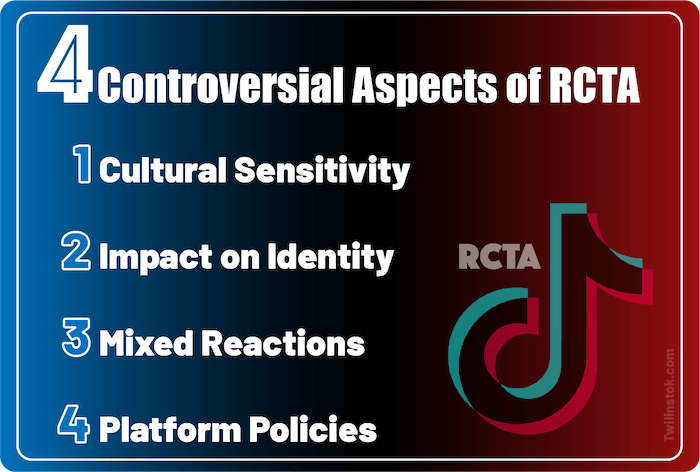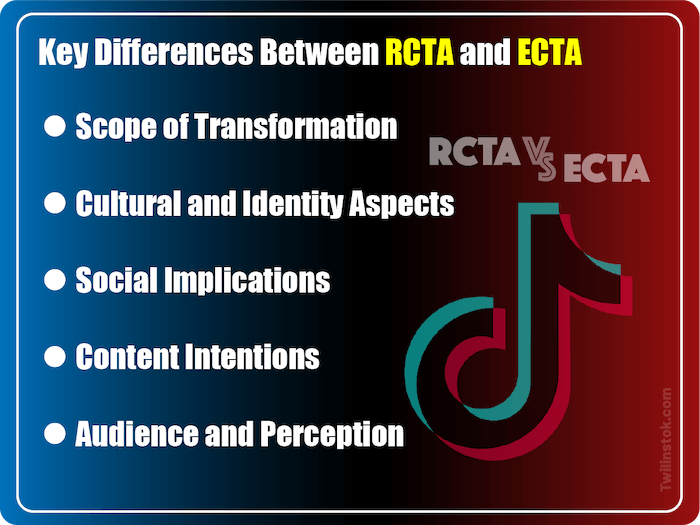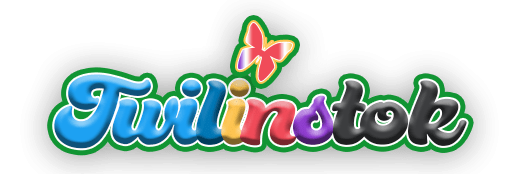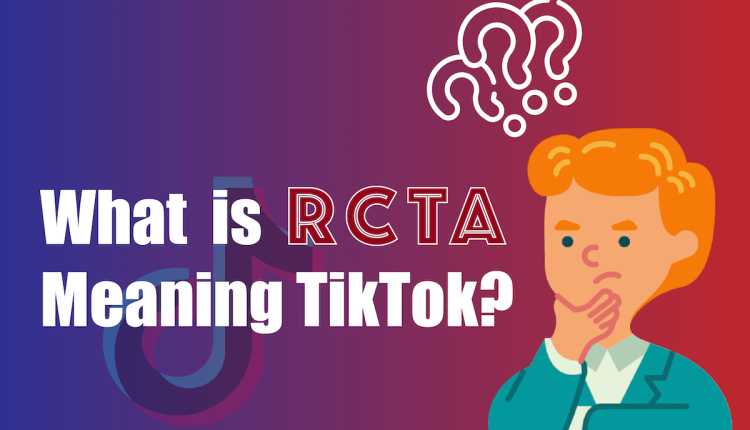Hey there, TikTok enthusiasts and curious netizens! It’s us again, and today, we’re diving into one of the hottest and most talked-about trends on the platform! What is RCTA meaning TikTok, and why is it causing such a stir in the TikTokverse? Well, you’ve come to the right place to unravel this digital mystery.
In the fast-paced world of TikTok, trends come and go quicker than you can say “viral video.” But every so often, a trend emerges that not only catches fire but also sparks intense debate and discussion. RCTA, which stands for “Race Change To Another,” is one such phenomenon that’s been making waves.
Whether you’re a TikTok aficionado or just casually scrolling through your “For You” page, you’ve probably encountered RCTA in various forms. But what does it mean? Is it all in good fun, or does it tread on contentious territory? In this article from Twilinstok, we’ll break down the ins and outs of RCTA, explore its origins, and delve into why it’s become a trending topic on TikTok.
What is RCTA?
Alright, let’s get down to the basics. What exactly is RCTA, and why is it buzzing on TikTok? RCTA stands for “Race Change To Another.” At its core, it’s all about users creating content that involves changing their appearance, identity, or even race, primarily through the magic of makeup and visual effects.
This trend isn’t entirely new to the internet – content creators have been experimenting with transformation videos for a while. However, TikTok has given RCTA a platform to shine like never before. TikTokers, armed with makeup brushes, wigs, and creative editing, take their viewers on a whirlwind journey of transformation. They go from one persona to another, showcasing the incredible power of makeup and special effects. Now, you might be wondering…
What’s The Big Deal?
People change their looks all the time.” True, but RCTA goes beyond just changing hairstyles or outfits. It often involves altering one’s racial appearance, which is where the controversy comes into play. Some argue that this form of transformation can perpetuate harmful stereotypes and cultural insensitivity.
But let’s not get ahead of ourselves. We’ll dive deeper into the controversies surrounding RCTA in a later section. For now, understand that RCTA is, at its core, about transformation and self-expression, but it’s also a topic that stirs up a lot of debate.
So, now that you’ve got a grasp of the RCTA meaning TikTok. So, let’s explore its origins and how it rose to prominence on TikTok.
The Controversial Nature of RCTA; Is RCTA valid?
So, we’ve answered What is an RCTA person. But it’s the controversial aspects that have truly put it in the spotlight. To understand why RCTA is making waves on TikTok, we need to peel back a few layers. In order to answer this question: Is RCTA valid? Here are the controversial aspects of RTCA:
- Cultural sensitivity
- Impact on identity
- Mixed reactions
- Platform policies
Now let’s check these aspects.

Cultural Sensitivity
One of the primary sources of controversy surrounding RCTA is the potential for cultural insensitivity. When creators change their racial appearance through makeup and visual effects, it can sometimes cross the line into caricature or stereotype. This raises concerns about perpetuating harmful racial stereotypes and cultural appropriation.
Impact on Identity
RCTA also raises questions about identity. Some argue that these transformations trivialize the experiences of individuals who face real challenges related to their racial or ethnic backgrounds. It’s essential to consider the implications of using race as a tool for entertainment and virality.
Mixed Reactions
As with many trends on TikTok, RCTA has generated mixed reactions. While some viewers appreciate the artistry and creativity behind these transformations, others feel uncomfortable or offended. The debate often centers around where to draw the line between self-expression and harmful content.
Platform Policies
TikTok has its policies and guidelines regarding content, including those related to controversial topics. Creators and viewers alike are navigating these policies and their application in the context of RCTA content.
As you can see, RCTA isn’t just about makeup and transformations; it’s a complex issue with layers of cultural, ethical, and social considerations. While some TikTokers embrace RCTA as a form of artistic expression, others view it as a problematic trend that needs closer scrutiny.
RCTA vs. ECTA: Understanding the Difference
Now that we know What is an RCTA person, Let’s get to know ECTA a little. In the world of TikTok trends, acronyms like RCTA and ECTA might seem similar at first glance, but they carry distinct meanings and implications. Let’s dive into the key differences between RCTA meaning TikTok and ECTA (Ethnicity Change To Another) to shed light on their unique characteristics:
- Scope of transformation
- Cultural and identity aspects
- Social implications
- Content intentions
- Audience and perception
Now let’s check these differences.

Scope of Transformation
RCTA (Race Change To Another): RCTA primarily focuses on the transformation of racial or ethnic identity. Creators may use makeup, visual effects, and creative storytelling to change their perceived racial appearance.
ECTA (Ethnicity Change To Another): ECTA, on the other hand, encompasses a broader spectrum of transformations related to ethnicity. This can include changes in cultural identity, customs, traditions, and more.
Cultural and Identity Aspects
RCTA: RCTA predominantly explores the visual aspect of identity transformation, such as skin color, facial features, and hair texture. It often raises questions about cultural sensitivity and the potential perpetuation of racial stereotypes.
ECTA: ECTA delves deeper into cultural and ethnic identity, encompassing aspects beyond physical appearance. Creators may incorporate elements like clothing, language, and customs to represent different ethnic backgrounds.
RCTA: Due to its focus on race, RCTA often sparks discussions about cultural appropriation, racial awareness, and stereotypes. Its impact extends to how viewers perceive and interpret racial identity transformations.
ECTA: ECTA discussions often center on the broader implications of representing diverse ethnicities and cultures. It prompts conversations about cultural appreciation, authenticity, and the responsibility of creators.
Content Intentions
RCTA: RCTA content can vary in intentions, from artistic expression and self-discovery to potential challenges of societal norms. It may carry the goal of sparking conversations about race and identity.
ECTA: ECTA content typically aims to explore and represent different ethnic backgrounds, fostering understanding and appreciation of cultural diversity. It may have an educational or celebratory intent.
Audience and Perception
RCTA: RCTA can elicit mixed reactions from audiences, given its potential to evoke strong emotions and discussions surrounding cultural sensitivity. It often requires creators to approach the content with heightened awareness.
ECTA: ECTA content tends to revolve around cultural exploration and sharing, which may be better received when creators demonstrate respect and authenticity in their representations.
While both RCTA and ECTA involve transformations related to identity, they diverge in their focus, implications, and content intentions. Creators and viewers alike should be mindful of these differences to engage in informed and respectful discussions within the TikTok community.
The Bottom Line
In a platform as diverse and dynamic as TikTok, trends like RCTA exemplify the power of self-expression, creativity, and community engagement. While RCTA may be controversial, it reflects the platform’s ability to foster conversations about complex social issues.
As TikTok continues to evolve, so too will the discussions and trends it hosts. RCTA is just one chapter in the ever-changing narrative of social media trends, leaving us with a deeper understanding of the complex intersections of identity, artistry, and digital culture.
Thank you for joining us on this exploration of RCTA meaning TikTok. We hope this article has shed light on this intriguing phenomenon, its controversies, and its place within the dynamic TikTok community. Stay tuned for more insights into the ever-evolving world of social media trends!
For more information about TikTok and the features of this social network, we suggest that you click on Free TikTok Tutorial [+]. Also, if you have any questions about TikTok, you can ask them in our TikTok support forum [+] in the form of a topic and wait for the answer from our experts.
FAQ
What is RCTA on TikTok?
RCTA stands for Race Change Transition Announcement, which is a trend where some TikTok users claim to have changed their race or ethnicity through surgery, makeup, or other means.
Who started the RCTA trend on TikTok?
The RCTA trend on TikTok was allegedly started by Oli London, a British influencer who underwent multiple surgeries to look like Jimin from the K-pop group BTS.
Why is RCTA considered offensive and disrespectful?
RCTA is considered offensive and disrespectful because it appropriates and stereotypes the cultures and identities of people of color while ignoring the historical and social contexts of racism and oppression.
How are TikTok users reacting to the RCTA trend?
TikTok users are reacting to the RCTA trend in different ways, such as mocking or exposing the RCTA users by making parody videos or sharing their own stories of racism and discrimination.
What is TikTok’s policy on RCTA content?
TikTok’s policy on RCTA content is not clear, but it may fall under the category of hate speech or harmful content, which are prohibited by the platform’s community guidelines.

